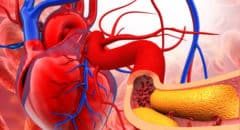
Flu and COVID are sweeping across the country, posing a particular hazard to people at risk for heart disease. These respiratory infections can trigger heart complications from fever, dehydration, and inflammation, according to experts from Mount Sinai Fuster Heart Hospital.
Mount Sinai doctors are seeing an increase in heart problems prompted by respiratory infections, and it’s happening across all age groups – even among young adults in their 20s. Inflammation can prompt heart attacks in people with clogged arteries, and it can also exacerbate symptoms related to heart failure or heart rhythm disorders, doctors said.
“Winter can raise cardiovascular risks in a number of ways, including due to flu season,” according to Dr. Deepak Bhatt, director of the Mount Sinai Fuster Heart Hospital. “People with cardiovascular disease or multiple risk factors for heart disease are particularly susceptible to developing cardiac problems if they get really sick from a respiratory infection,” Bhatt said in a hospital news release. “Identifying and controlling cardiovascular risk factors, as well as basic measures to try to prevent infections, are ways to avoid a potential double whammy of a bad infection triggering a heart attack.”
Heart disease is the leading cause of death among U.S. men and women, and nearly half of adults have some type of heart disease. Nearly 700,000 people die every year from heart disease, and eight out of 10 deaths are preventable, according to the U.S. Centers for Disease Control and Prevention.
High blood pressure, elevated cholesterol, diabetes, excess weight, smoking, and age are all risk factors for heart disease.
RELATED: The Importance of Protecting Yourself and Others From the Flu
Tips to Protect Your Heart
Know Your Family History: Understanding your family’s history of heart problems can help you assess your own risk.
Monitor Your Vital Signs: Keep track of your blood pressure, total cholesterol, “good” HDL cholesterol, body-mass index (BMI), and blood sugar levels regularly.
Adopt a Healthy Diet: Eating a balanced diet with plenty of fruits, vegetables, whole grains, lean proteins, and healthy fats can support heart health.
Limit Alcohol Consumption: Stick to one drink a day for women and up to two drinks a day for men, as excessive alcohol can
The Latest In ATTR-CM

ATTR-CM: Understanding This Rare But Serious Condition

5 Heart Failure Symptoms Doctors Commonly Miss

Staying Active Safely: Exercise Tips If You Have ATTR-CM

Irregular Heartbeat: What Is It and How Do You Treat It?

8 Signs You’re Living With Clogged Arteries

How ‘The Blind Side’ Actor Lost 170 Pounds: “The Weight Started Falling Off”
Footer
Where Wellness & Culture Connect
BDO is the world’s largest and most comprehensive online health resource specifically targeted to African Americans. BDO understands that the uniqueness of Black culture - our heritage and our traditions - plays a role in our health. BDO gives you access to innovative new approaches to the health information you need in everyday language so you can break through the disparities, gain control and live your life to its fullest.
Copyright © 2024, BlackDoctor, Inc. All rights reserved.
